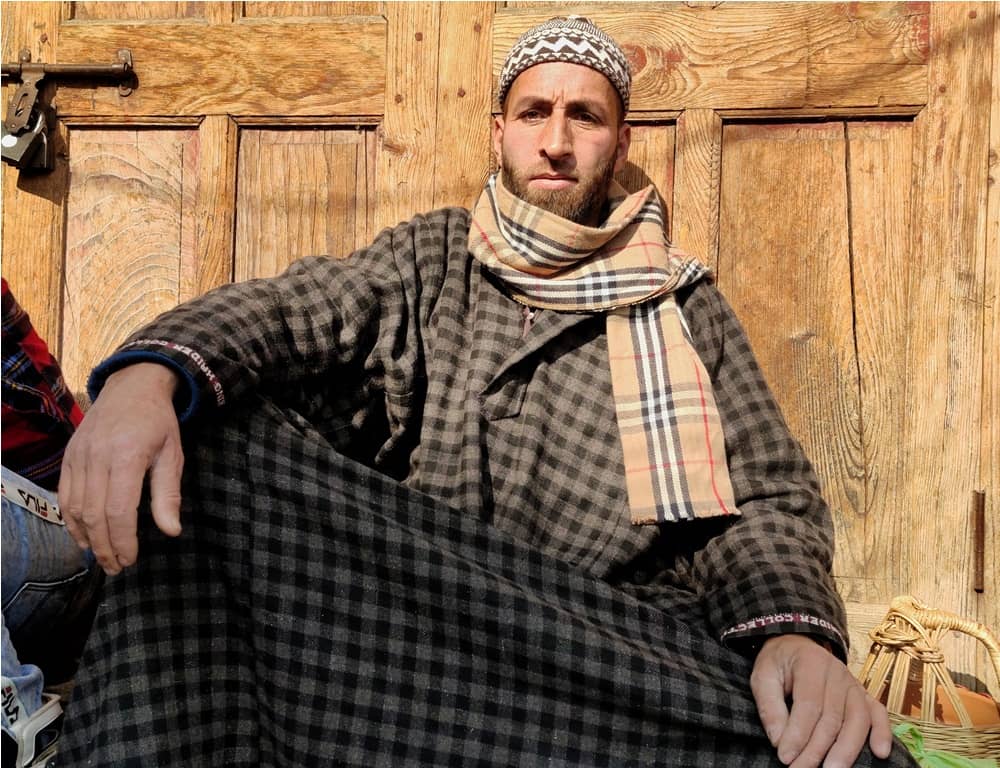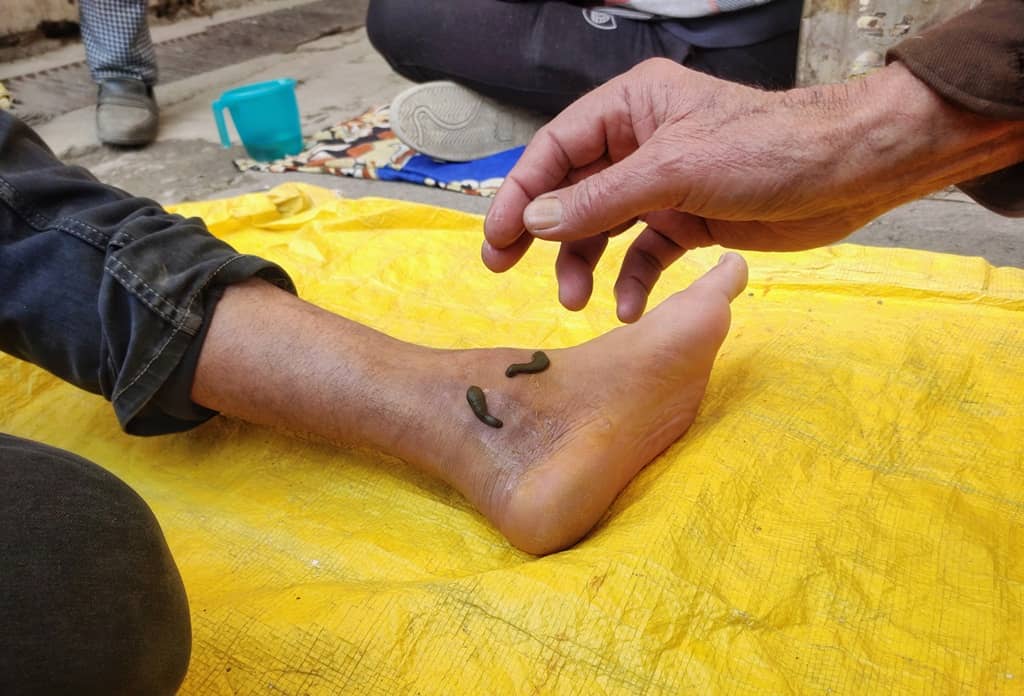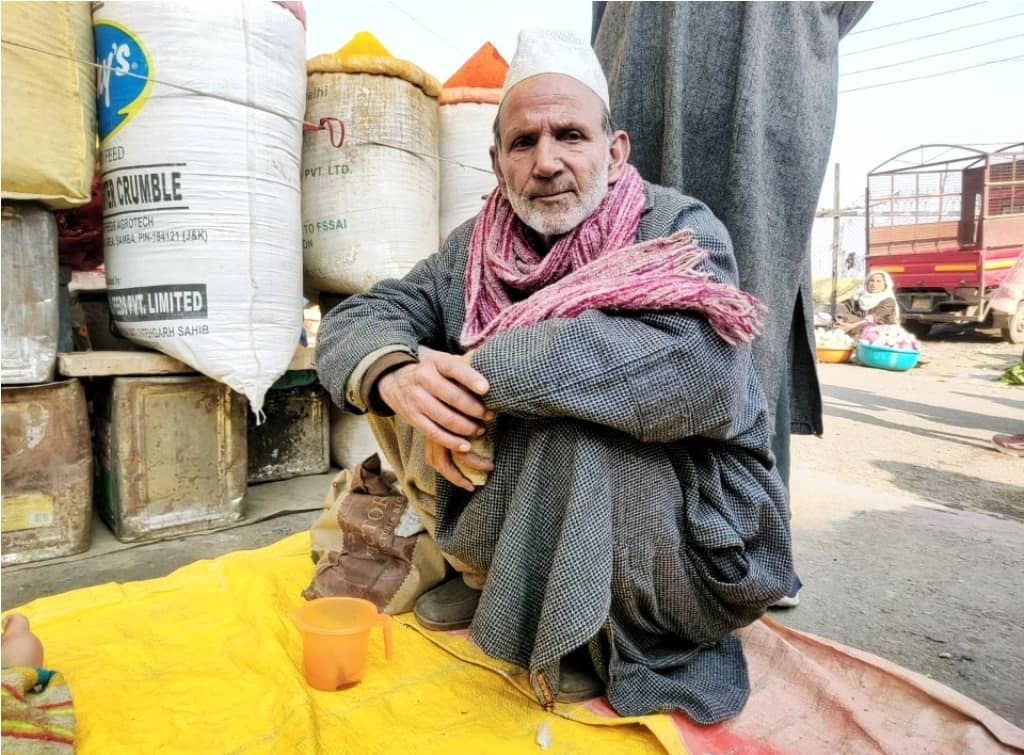Chiropractors of Kashmir’s Faithful Bazar

Aayat Tramboo is a writer and poet. She is a…
People in many areas believe that faith-healing and chiropractic therapies are more reliable than the traditional medical ways.
Darood and cries of emancipation rented the air as faithful swarm the sanctum streets for Friday congregation at Dargah, Hazratbal. Reverberation of prayers played out like a meditative melody as musing men and women along with their frown-faced young ones stride the street stiffened by stalls of spices, vegetables, clothes and homemade medicines.
Amid the broadcasting beseeching from the shimmering tombs of the sanctum, the street shrill came loudest from across the corner where a man selling “one of a kind magical pill” picked an old man, to demonstrate the healing powers of his oil.
He picked a bottle from his stall, put a few drops of the transparent liquid on his hands and rubbed it against the old man’s neck. “Instant relief, instant relief, instant relief” became the market cry and soon eager passersby swarmed his stall.
But beyond this competing sanctum-street pitch, some old-timers—“the sages” in commoners’ robes—are sitting silent, almost in a meditative mood. They’re placid photos in the sea of animated faces.
Among them is Ghulam Mohammad sitting by the end of the lane. Along with his workmates, he quietly attends to people with aching backs and broken wrists. He cuts some surgical paper tape from the roll and wrapped it tightly around his patient’s wrist. He had been feeling pressure and discomfort in his left hand. Some surgical tape and gauze were all what the bone fitters in the Hazratbal market used in addition to massages.
Support Our Journalism
You are reading this because you value quality and serious journalism.
But, serious journalism needs serious support. We need readers like you to support us and pay for making quality and independent journalism more vibrant.

As the sanctum reverberates with the pleadings, the sullen silence at this corner of the bazar is quite clinical. Waiting in line for a literal diagnosis was little Abida. Her mother told the bone fitter that she fell while play-chasing her younger brother and hurt her arm.
The street-side chiropractor examined the little one’s arm, exercised her wrist and massaged it for nearly seven minutes or so. He then put some surgical tape around her arm and suggested her to take rest for a couple of days. “Listen to your mother,” little Abida was told, “and don’t be mischievous!”
Having 20 years of experience in identifying muscle and bone injuries, Ghulam Mohammad attends nearly a hundred patients every day. He learnt the various techniques of chiropractic therapy from his father who learnt it from his grandfather.
“This practice has been in our family for years and I am teaching it further to my kids so that it doesn’t die,” said Ghulam Mohammad. His teen son accompanies him to work and sits by his side, watching closely as his father deals with patients.
Faith healing and chiropractic therapies have been in practice in Kashmir for longer than one can remember. People in many areas believe these unconventional healing practices to be more reliable than the traditional medical ways. Some are attracted to these faith healers for their “cost efficiency”, some believe their touch has “Shifa” (curing benefits) and some are drawn to them by their disbelief in doctors and their methods.
Riyaz Ahmad, one of the patients of Ghulam Mohammad, believes that doctors are used to writing long prescriptions unnecessarily. “They put you on week’s bed rest and prescribe you medicines worth thousands of rupees and they think their job is done,” he smirked.
Another patient, holding his back with one hand, added, “Nothing compares to the knowledge of these bone fitters, they know by the look of it, if the injury is too deep.”

Besides bone-fitting, leech therapy is another common form of faith-healing in Kashmir. And Wali Mohammad is its well-known practitioner.
A leech therapist of forty years, he started a conversation with his patient to keep him distracted while two leeches sat on his ankle which he had fractured in a motorcycle accident. Having been bedridden for nearly two weeks with a plastered leg, his ankle had turned red and grey. For quick relief, he had come to see Wali.
Leeches are believed to suck impure blood and have pain-relieving benefits. Many Muslims across the valley believe for it to have a great religious significance too. One of Wali’s patients explained, “Once, one messenger of Allah had erred. As a punishment leeches were put on him over and over again and once he repented, Allah forgave him. Since then Muslims use it as a pure and blessed method for healing injuries.”

However, the techniques used by faith-healers and bone-fitters are questioned and criticized as much as they’re appreciated.
Doctors believe that meddling with an injury without prior investigation and study can intensify it in the worst ways. “People should consult doctors over ‘wrattangaer’ (bone fitters), because knowing the anatomy of the injured area is important before starting any procedure on it or the nerves and vessels might get injured,” said Dr. Imran Sheikh, an Orthopedician with twenty-five years of professional experience.
“Many bone-fitters massage injuries with ointments which can lead to Myositis Ossificans (deposit of bone in muscle tissue, causing pain and swelling).”
Dr Imran recalled an incident when a bone-fitter had aggravated an injury of one of his patients. The patient had pushed a punctured car all by himself, pressuring his back and causing a haemorrhage in his spinal canal.
For quick and easy relief, he went to a bone-fitter who treated him by pulling his legs vigorously and put him on bed rest. After a while when his condition seemed to worsen, he came for a medical checkup.
“By the time he was brought to us, the haemorrhage had extended up to dorsal D4 region which lead to paralysis of his respiratory muscles and we had to put him on a ventilator all for one wrong step.”

However, neither Wali nor his loyal followers are bothered about the medical advice. They call it traditional therapy with immense benefits.
But between Dr Imran’s scientific and bone-fitter Wali’s spiritual faith, Kashmir is sitting on the fence between traditional medicine and unconventional faith-healing.
“We’re doing an act of humanity by healing people and bringing ease to their lives,” Wali said.
“We don’t deceive any of our patients. When we feel that the injury is too deep, we suggest them to consult a doctor and get an X-ray done. We put our patient’s well-being over everything else which is why we don’t even have fixed rates, whatever they give, we accept with humility.”
Mountain Ink is now on Telegram. Subscribe here.
Become Our Ally
To help us strengthen the tradition of quality reading and writing, we need allies like YOU. Subscribe to us.
Aayat Tramboo is a writer and poet. She is a bachelor's student of Journalism and Mass Communication at the Cluster University, Srinagar, and is currently an editorial intern at the Mountain Ink.














I may not be the right person to say, but i think the author has made a mistake (unintentionally), upon quoting; cause there’s not a single reference to that, And i quote :
“Once, one messenger of Allah had erred. As a punishment leeches were put on him over and over again and once he repented, Allah forgave him. Since then Muslims use it as a pure and blessed method for healing injuries.”
اہلِ سنت والجماعت کے اعتقاد کے مطابق انبیاء کرام علیہم الصلاۃ والسلام
معصوم اور صحابہ کرام رضی اللہ عنہم محفوظ کہلاتے ہیں۔
Prophets/Messengers can’t make mistakes,
What makes it worse, is attempting to make your argument sound right, by giving justification of punishment….
E’en if its not the author but her subject who misquoted, but there’s a thing called Research Ethic.
When i quote someone, it only means i agree with that part, of what was said originally…